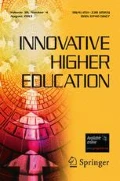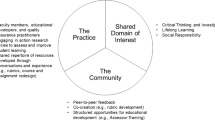Abstract
Assessment of learning outcomes at the program level is essential to evaluate whether students are achieving what is expected of them as graduates. In this article we present the results of a study in which faculty focus groups were consulted so as to understand the subjective issues that surround the learning outcomes assessment program of an institution. We hope that our study contributes to continuous improvement in institutional assessment practices and to the improvement of student learning. We analysed the data through the lens provided by a leadership model since leadership is a key driver of assessment practices that lead to changes to improve student learning.


Similar content being viewed by others
References
Arcario, P., Eynon, B., Klages, M., & Polnariev, B. A. (2013). Closing the loop: How we better serve our students through a comprehensive assessment process. Metropolitan Universities Journal, 24(2), 21–37.
Banta, T. W. (2011). Demonstrating the impact of changes based on assessment findings. In T. W. Banta (Ed.), A bird’s eye view of assessment: Selections from editor’s notes (pp. 42–46). San Francisco, CA: Jossey-Bass.
Banta, T. W., & Palomba, C. A. (2015). Assessment essentials: Planning, implementing, and improving assessment in higher education. San Francisco, CA: Jossey-Bass.
Banta, T. W., Jones, E. A., & Black, K. E. (2009). Designing effective assessment: Principles and profiles of good practice. San Francisco, CA: Jossey-Bass.
Blaich, C., & Wise, K. (2011). From gathering to using assessment results: Lessons from the Wabash national study. Urbana, IL: University of Illinois and Indiana University, National Institute for Learning Outcomes Assessment. Retrieved from http://www.learningoutcomeassessment.org/documents/Wabash_001.pdf
Bolman, L. G., & Deal, T. E. (2003). Reframing organizations: Artistry, choice, and leadership. San Francisco, CA: Jossey-Bass.
Cassell, C. (2009). Interviews in organizational research. In D. A. Buchanan & A. Bryman (Eds.), The SAGE handbook of organizational research methods (pp. 500–515). Thousand Oaks, CA: SAGE.
Drew, G. (2010). Issues and challenges in higher education leadership: Engaging for change. Australian Educational Researcher, 37(3), 57–76.
Fulcher, K. H., Good, M. R., Coleman, C. M., & Smith, K. L. (2014). A simple model for learning improvement: Weigh pig, feed pig, weigh pig. Urbana, IL: University of Illinois and Indiana University, National Institute for Learning Outcomes Assessment. Retrieved from http://www.learningoutcomesassessment.org/documents/Occasional_Paper_23.pdf
Guetterman, T. C., & Mitchell, N. (2015). The role of leadership and culture in creating meaningful assessment: A mixed methods case study. Innovative Higher Education. doi:10.1007/s10755-015-9330-y
Johnson, G. (1992). Managing strategic change- strategy, culture and action. Long Range Planning, 25(1), 28–36.
Kezar, A. (2013). Institutionalizing student outcomes assessment: The need for better research to inform practice. Innovative Higher Education, 38, 189–206.
Kezar, A., & Carducci, R. (2008). Revolutionizing leadership development: Lessons from research and theory. In A. Kezar (Ed.), Rethinking leadership in a complex, multicultural, and global environment: New concepts and models for higher education (pp. 1–38). Sterling, VA: Stylus.
Kuh, G. D., Ikenberry, S. O., Jankowski, N. A., Cain, T. R., Ewell, P., Hutchings, P., & Kinzie, J. (2014). Using evidence of student learning to improve higher education. San Francisco, CA: Jossey-Bass.
McCullough, C. A., & Jones, E. (2014). Creating a culture of faculty participation in assessment: Factors that promote and impede satisfaction. Journal of Assessment and Institutional Effectiveness, 4, 85–101. doi:10.1353/aie.2014.0000
Miller, R. (2009). Assessment in cycles of improvement: Faculty designs for essential learning outcomes. Washington, DC: American Association of Colleges and Universities.
Morrill, R. L. (2007). Strategic leadership: Integrating strategy and leadership in colleges and universities. Lanham, MD: Rowman & Littlefield.
Ndoye, A. (2013). Promoting learning outcomes assessment in higher education: Factors of success. Journal of Assessment and Institutional Effectiveness, 3, 157–175. doi:10.1353/aie.2013.0008
Ndoye, A., & Parker, M. A. (2010). Creating and sustaining a culture of assessment. Planning for Higher Education, 38(2), 28–39.
Peterson, M. W., & Vaughan, D. S. (2002). Promoting academic improvement: Organizational and administrative dynamics that support student assessment. In T. W. Banta (Ed.), Building a scholarship of assessment (pp. 26–46). San Francisco, CA: Jossey-Bass.
Rodgers, M., Grays, M. P., Fulcher, K. H., & Jurich, D. P. (2013). Improving academic program assessment: A mixed methods study. Innovative Higher Education, 38, 383–395.
Ryan, N. (1995). Unravelling conceptual developments in implementation analysis. Australian Journal of Public Administration, 54, 65–80.
Schoepp, K., & Benson, S. (2016). Meta-Assessment: Assessing the learning outcomes assessment program. Innovative Higher Education, 41, 287–301. doi:10.1007/s10755-015-9347-2
Snape, D., & Spencer, L. (2003). The foundations of qualitative research. In J. Ritchie & J. Lewis (Eds.), Qualitative research practice: A guide for social science students and researchers (pp. 1–23). London, United Kingdom: Sage.
Suskie, L. (2009). Assessing student learning: A common sense guide. San Francisco, CA: Jossey-Bass.
Suskie, L. (2014). Five dimensions of quality: A common sense guide to accreditation and accountability. San Francisco, CA: Jossey-Bass.
Walvoord, B. E. (2010). Assessment clear and simple: A practical guide for institutions, departments, and general education. San Francisco, CA: Jossey-Bass.
Wilkinson, S. (2004). Focus group research. In D. Silverman (Ed.), Qualitative research: theory, method, and practice (pp. 177–199). London: SAGE.
Author information
Authors and Affiliations
Corresponding author
Rights and permissions
About this article
Cite this article
Schoepp, K., Tezcan-Unal, B. Examining the Effectiveness of a Learning Outcomes Assessment Program: a Four Frames Perspective. Innov High Educ 42, 305–319 (2017). https://doi.org/10.1007/s10755-016-9384-5
Published:
Issue Date:
DOI: https://doi.org/10.1007/s10755-016-9384-5




